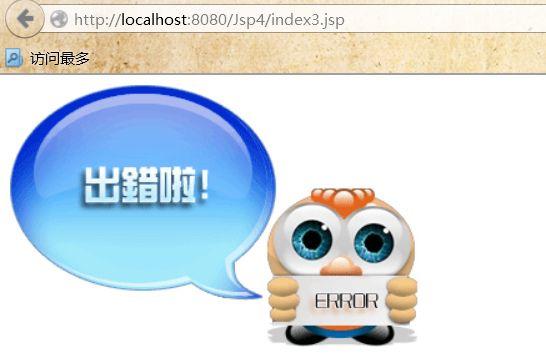index.jsp(contentType,pageEncoding,import)
<%@page contentType="text/html" %> <%@page pageEncoding="UTF-8" %> <%@page import="java.util.Date" %> <%@page import="java.util.*,java.text.SimpleDateFormat" %> <%-- 关于JSP的指令: 1、指令的作用,是指导JSP的翻译引擎如何翻译JSP代码。 2、JSP中共三个指令: * page 页面指令 * include 包含指令 * taglib 标签库指令【以后讲】 3、指令的使用语法格式: <%@指令名 属性名=属性值 属性名=属性值.....%> 3、关于JSP的page指令,page指令中常用的属性: * contentType 设置JSP的响应内容类型,同时在响应的内容类型后面也可以指定响应的字符编码方式 * pageEncoding 设置JSP响应时的字符编码方式 * import 组织导入 * session 设置当前JSP页面中是否可以直接使用session内置对象 * errorPage 错误页面 * isErrorPage 是否是错误页面 * isELIgnored 是否忽略EL表达式【后期讲】 --%> <% Date nowTime = new Date(); %> <%=nowTime %> <br> <% SimpleDateFormat sdf = new SimpleDateFormat("yyyy-MM-dd"); %> <%=sdf.format(nowTime) %>

index2.jsp(session)
<%-- <%@page contentType="text/html; charset=UTF-8" session="true"%> <%=session %> --%> <%-- 关于page指令中的session属性: - session="true" * 表示在当前JSP中可以直接使用内置对象session * 程序执行的时候获取当前的session会话对象,若获取不到则新建session对象 - session="false" * 表示在当前JSP中不能直接使用内置对象session * 但是有一些业务可能要求在当前JSP页面中获取当前的session对象,没有获取到则不新建session对象,此时需要编写以下程序 - 若session这个属性没有指定,默认值就是session="true" --%> <%@page contentType="text/html; charset=UTF-8" session="false"%> <% HttpSession session = request.getSession(false); %> <%=session%>

index3.jsp
<%@page contentType="text/html; charset=UTF-8" errorPage="/error.jsp"%> <%-- 关于page指令的errorPage属性: 当前JSP页面处错之后,要跳转的页面路径,需要使用该属性指定。 --%> <% String s = null; s.toString(); %>

error.jsp
<%@page contentType="text/html; charset=UTF-8" isErrorPage="true"%>
<html>
<head>
<title>错误页面</title>
</head>
<body>
<img src="./images/error.gif" />
</body>
</html>
<%--
关于page指令中的isErrorPage属性:
- isErrorPage = "false" 表示内置对象exception无法使用【缺省情况下是false】
- isErrorPage = "true" 表示内置对象exception可以使用
--%>
<%-- 使用内置对象exception打印异常堆栈追踪信息 --%>
<%-- exception引用指向了抛出的异常 --%>
<%
exception.printStackTrace();
%>
error.gif
